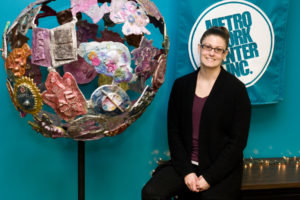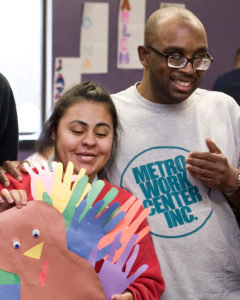By MARGIE O’LOUGHLIN
The Metro Work Center (MWC) is a community-based day program for adults with developmental disabilities. Located on the third floor of Holy Trinity Lutheran Church at 2730 E. 31st St., the program is in its 50th year of providing services—and is looking for more ways to connect with the surrounding neighborhood.
Executive director Julie Washington explained, “We’re a non-profit agency licensed for up to 57 adult participants; most participants who come to us are involved in our employment options. We have a regular crew that goes to Alexander’s Import Auto Repair down the street and provides cleaning services. There are several teams that are paid to help neighborhood residents with seasonal raking, mowing, and snow removal. We’re looking to partner with more neighborhood businesses and homeowners, who believe in our mission of community inclusion for people of all abilities.”
 Photo right: Executive director Julie Washington of the Metro Work Center. MWC provides job opportunities, life skill development, and community integration for adults with developmental disabilities. On the left is a metal project made by MWC participants and artists through the Community Connects Program (see the article on page 8). (Photo by Margie O’Loughlin)
Photo right: Executive director Julie Washington of the Metro Work Center. MWC provides job opportunities, life skill development, and community integration for adults with developmental disabilities. On the left is a metal project made by MWC participants and artists through the Community Connects Program (see the article on page 8). (Photo by Margie O’Loughlin)
Like many community programs, MWC began as a congregational effort. In 1965, Holy Trinity started an arts and crafts program for teenagers who, at the time, were labeled “mentally retarded” and not allowed to attend public school. Three years later, the congregation recognized the needs of the broader community and formalized the program as a day activity center with paid staff. By the 1970’s, public schools had changed their language—and their model for accepting students with special needs. MWC began serving adults instead of teens, and their emphasis shifted to in-house vocational training.
Washington started as a direct support professional at MWC 15 years ago while she was still a college student. “At the state and federal level, there’s a big push for community inclusion right now, which we're already providing,” Washington said. “In the last 50 years, we’ve seen a shift from institutionalizing people with developmental disabilities to having full access to the benefits of community life. MWC works on a combined model of work, social involvement, leisure, and recreation.”
 Photo left: MWC participant Rickeem (right) said, “I like hanging out with my friends here.” He works two days per week at a South Minneapolis nursing home, helping to set the tables at mealtime. The person-centered programming at MWC is designed to meet the individual needs of participants. (Photo by Margie O’Loughlin)
Photo left: MWC participant Rickeem (right) said, “I like hanging out with my friends here.” He works two days per week at a South Minneapolis nursing home, helping to set the tables at mealtime. The person-centered programming at MWC is designed to meet the individual needs of participants. (Photo by Margie O’Loughlin)
Washington elaborated, “As part of our leisure and recreational programming, we take a person-centered approach and make weekly trips into the community. We enjoy walking to the many businesses in the neighborhood and, when weather permits, traveling to places such as Como Zoo, museums, parks, and baseball games.”
Like all direct service organizations in Minnesota, MWC is facing a critical funding and staffing shortage. Washington, as already noted, is the executive director, but most days, she wears several other “hats.” She also serves as CEO, CFO, HR director, and direct support professional when needed.
She explained, “We currently have ten direct support professionals and two program coordinators. We have a direct support professional position available, but it’s been hard to fill. The Minnesota Department of Human Services (DHS) implemented a 7% cut to funding to critical services this summer. An estimated 32,000 people with developmental disabilities rely on that funding, as well as 300 provider organizations like ours that provide those services state-wide. We operate on a very tight budget.”
She continued, “The position we have would be ideal for someone interested in a career working with people with developmental disabilities. A college student studying psychology or special education would gain relevant experience. We could also use committed community volunteers, willing to go on vocational or recreational trips into the community with us. For instance, we used to help shelf books at the East Lake Library, but we just don’t have enough staff or volunteers to take a group there right now.”
To learn more about supporting MWC by hiring a crew, becoming a volunteer, or to make a donation, contact Julie Washington at jwashington@metroworkcenter.org or call 612-729-7381.
Comments
No comments on this item Please log in to comment by clicking here